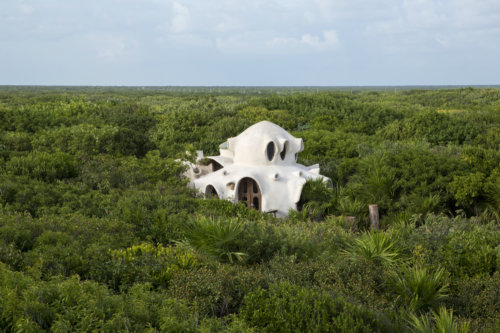
At Papaya Playa Project in Tulum, Cashew Orchards and Solar Panels Abound
The Papaya Play Project is a beautiful, unassuming hotel and spa located on the serene Tulum Beach in Tulum, Mexico– but it’s also one of the most sustainable hotels in Mexico, having implemented “proven technologies, changing paradigms, and administrating better energy sources” with the goal of achieving zero aquifer contamination and zero carbon emissions by June of 2018.
Most impressive, however, is the manner in which the Papaya Playa Project is able to achieve sustainability in style. PPP has an existing cashew nut orchard with 150 banana and coconut trees implemented to revitalize the soil naturally, with micro-nutrients and organic fertilizers that can sustain the plantation while the property managers add more trees. Currently, the hotel is expanding their plantation with chickoo, papaya, pineapple, guava, jackfruit, breadfruit, banana, cashew, coconut, and watermelon plants.
PPP has pledged to reduce carbon emissions by almost 99% annually by December 2018, by installing a solar energy system that will prevent carbon emissions of up to 1,000 kilos annually per room (which means that each room will prevent up to 205 tones of carbon dioxide from releasing into the atmosphere annually).
To ensure that guests have high quality water with the lowest energy expended for treatment, Papaya Playa Project recycles their waste water, which is treated and recycled for irrigation of plants and jungles. The food served on site is also locally grown wherever possible and sourced from organic gardens.
“Sustainability means life for future generations and integrity for the current one.”
— Emilio Heredia, Project Director at Papaya Playa Project
Overall, The Papaya Playa Project is focused on a few a key areas of sustainability and social responsibility, which are paving the way for other hotels in the region to follow suite: solar energy, water treatment and recycling, gardening and plantations, local sourcing, fair trade, responsible construction, material recycling, and community involvement using measurable standards to demonstrate continuous improvement and hold them accountable to their goal of becoming 100% sustainable (meaning “zero emissions and zero contamination”) by June 2018. “Our goal is a totally sustainable project that is of true benefit to the region and community, [to] promote a holistic and spiritual life and consciously accept responsibility for Nature and our Community,” the hotel writes on their site.
Jungle conservation also factors into the equation. “The property in Papaya Playa Project could easily carry a 1,500 room all inclusive hotel if we followed the crowd like most developers along the Riviera Maya coast. Replicating the business models [commonly used in] Cancun and Playa del Carmen would permanently create ambient light pollution and so much competition for the stars that they would, somehow, disappear in the night sky.” However, the resort has retained 93% of the land’s original jungle and plans to continually restore and support the local ecosystem by encouraging well-managed ecotourism. Instead of denigrating the beautiful ecosystem they’ve come to enjoy, guests, instead, will leave only footprints.
For more information on the Papaya Playa Project, visit the hotel’s website.














































